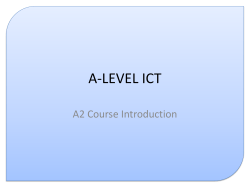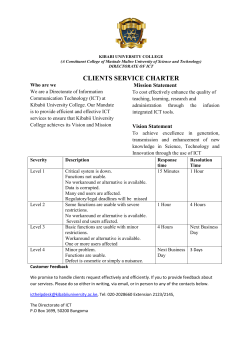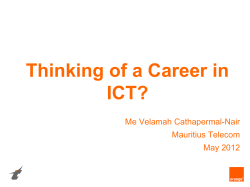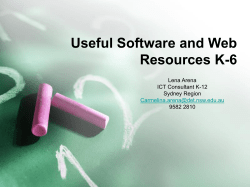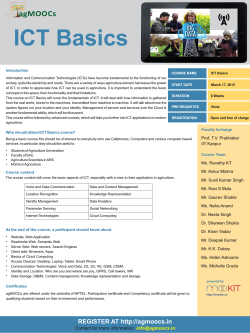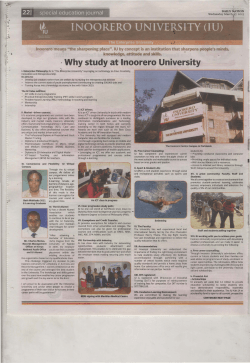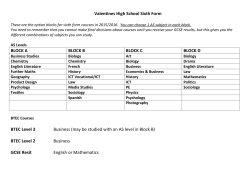
A-Level
A-Level Applied ICT Accounting Contents A-Level Applied ICT : An Introduction 03 Year I Unit : The Information Age 05 Year I Unit : The Digital Economy 05 Year I Unit : The Knowledge Worker 06 Year II Unit : Using Database Software 06 Year II Unit : Managing ICT Projects 07 Year II Unit : Using Spreadsheet Software 07 A-Level Accounting : An Introduction Year I Unit : The Accounting System and Costing 09 10 Year II Unit : Corporate and Management Accounting 11 A-Level Applied ICT: An Introduction Applied ICT First year consists of three units. First two units are ‘practical’ Applied ICT Second year consists of three units out of which one unit is coursework. These two units will be assessed by BiMS and moderated by practical exam. Remaining two units are coursework which are assessed Edexcel. British Council will conduct the practical exam for the 3rd unit. by BiMS. There are no exam at British Council in 2nd year. Unit Title Assessment/ Exam Centre Availability Unit Title Assessment/ Exam Centre Availability The Coursework The coursework can be Using Practical Exam Practical exam takes place at Information at BiMS completed anytime of the year. Database at BiMS BiMS in the month of June. However, Edexcel (UK) Software Managing Coursework The coursework can be ICT Projects at BiMS completed anytime of the year. Age moderation takes place in the month of June. The Digital Coursework at The coursework can be However, Edexcel (UK) Economy BiMS completed anytime of the year. moderation takes place in the However, Edexcel (UK) month of June. moderation takes place in the month of June. Using Coursework The coursework can be Spreadsheet at BiMS completed anytime of the year. The Practical Exam Practical exam takes place at Knowledge at British British Council in the month of moderation takes place in the Worker Council June. month of June. Software However, Edexcel (UK) Syllabus - Information & Communication Technology 3 “Globalisation and rapid technological changes have made Information & Communication Technology (ICT) a critical determinant of competitiveness.” Applied ICT - Year I Unit: The Information Age Applied ICT - Year I Unit: The Digital Economy In this unit you will learn about the information communication Paperless transactions are hallmarks of the digital economy. In the technologies that enable people to access and exchange information global e-marketplace transactional websites are the interface and to carry out transactions anytime, anywhere.You will take a between e-enabled customers and organisations, allowing them to critical look at the impact that the internet has had on the way do business with one another anytime, anywhere. Enhanced people conduct their personal and professional lives, explore the connectivity underpins the growth of the digital economy. The services it offers and gain ‘hands-on’ experience of using some of proliferation of internet-enabled computers in the home and the use them. You will investigate the causes and effects of the digital divide of credit/debit cards to pay for goods are major factors in its which separates the ‘haves’ from the ‘have nots’ and evaluate evolution. In this unit, you will investigate how organisations are measures being taken to bridge the gap. Throughout the unit you responding to the pressures of the e-marketplace by using will acquire the tools and techniques you need to make effective use transactional websites to present their products and services, gather of the information available to you on the internet. The skills and information and provide a personalised service. Databases are key to knowledge you gain whilst studying this unit will be a useful managing the large amount of data that organisations collect. You foundation for the rest of the qualification. will learn how to use simple database software to analyse data and identify patterns. Syllabus - Information & Communication Technology 5 Applied ICT - Year I Unit: The Knowledge Worker In this Information Age computers and communications technology provide many of us with access to vast quantities of information. As ICT users, we need to make judgements about sources and accuracy of information and be able to select and manipulate information to support sound decision making. Knowledge workers are discerning consumers of information. They have the information-handling skills to turn information into knowledge. In this unit you will learn about making informed decisions using the knowledge available to you. You will learn how to select your sources and decide on how much credence you can place in them. You will learn that there are often many factors to consider when making a decision and that part of the process is to identify gaps in your knowledge. Applied ICT - Year II Unit: Using Database Software In this unit you will develop your knowledge of, and skills in using, databases further. You will learn the principles of data modelling and sound database design, and will use relational database software to build working database systems capable of storing large quantities of data and of handling both routine and one-off requests for information. This is a user-focused unit. The knowledge and skills developed in this unit are particularly relevant to those who use advanced ICT skills on a daily basis at work or at school/college for personal, social and work-related purposes. Your work for this unit will culminate in the design, development, testing and evaluation of a database for a specific purpose within a given scenario. www.bimsedu.com 6 Applied ICT - Year II Unit: Managing ICT Projects Applied ICT - Year II Unit: Using Spreadsheet Software It is now widely recognised that specialist knowledge and skills are In this unit you used spreadsheet models to investigate alternatives required to manage projects successfully. This unit will introduce you and make decisions. You saw what a versatile and powerful decision to some formal project management tools and methods and give making tool a spreadsheet can be. In this unit you will learn the skills you an opportunity to use specialist software to plan and monitor and techniques needed to design and create technically complex projects. The summative evaluation of your work for this unit will take spreadsheets yourself. Your work for this unit will culminate in the the form of an end-of-project review at which you and other project design, development and testing of a spreadsheet capable of stakeholders will assess the success of the project and your analysing, interpreting and communicating complex data. You will performance as the project manager. This is a user-focused unit. The need to work with a user to develop a set of user requirements that knowledge and skills developed in this unit are particularly relevant will enable you to demonstrate your competence. This is also a to those who use ICT on a daily basis at work or at school/college for user-focused unit. The knowledge and skills developed in this unit are personal, social and work-related purposes. This is not a team particularly relevant to those who use advanced ICT skills on a daily activity, but will involve working closely with others, since people skills basis at work or at school/college for personal, social and and work-related purposes. good communication are key to successful project management. Syllabus - Information & Communication Technology 7 “In the business world, accounting is one discipline of study that all people, regardless of job position, should have some knowledge of.” A-Level Accounting: An Introduction Accounting - Year I First year has one unit. This unit is examined through British Council. Unit Title Assessment/ Exam Centre Availability The Accounting British Council Exams are available in both System & January & June Costing Accounting - Year II Second year also has single unit. This unit is also examined through British Council. Unit Title Assessment/ Exam Centre Corporate & British Council Management Availability Exams are available in both January & June Accounting Syllabus - Accounting 9 Year I Unit: The Accounting System and Costing Students will be assessed on their knowledge, understanding and skills of accounting systems and costing. The unit is divided into six topics: 1. Principles of accounting and double entry book-keeping 2. Control procedures 3. Financial statements of organisations 4. Introduction to costing 5. Analysis of accounting statements 6. Social and ethical accounting. Examination 200 marks, 3 hours Section A – Two compulsory 55-mark, multi-part questions based on given data. Section B – Three optional 30-mark, multi-part questions from a choice of four. www.bimsedu.com 10 Year II Unit: Corporate and Management Accounting Students will be assessed on their knowledge and understanding of and skills in corporate and management accounting. The unit is divided into nine topics: 1. Limited companies 2. Investment ratios 3. Statement of cash flows 4. Budgeting 5. Standard costing 6. Project appraisal 7. Break-even analysis 8. Marginal costing and absorption costing 9. Information & communication technology (ICT) in accounting. Examination 200 marks, 3 hours Section A – Two compulsory 55-mark, multi-part questions based on given data. Section B – Three optional 30-mark, multi-part questions from a choice of four. Syllabus - Accounting 11 About BiMS With a history dating back to 2004, BiMS has established a reputation for international standard teaching which has made us one of the top institutes for UK education. BiMS strives to equip students with the right tools to meet the global challenges of today. BiMS is affiliated with Bangladesh Technical Education Board (BTEB) and Dhaka Board of Intermediate & Secondary Education. In addition, BiMS has strong network of international collaboration and partnerships. BiMS is an approved learning partner of Heriot-Watt University (UK), the Institute of Chartered Accountants in England & Wales (ICAEW) and Scottish Qualifications Authority (SQA). BiMS maintains a close relationship with Pearson Qualifications International. BiMS is an edexcel-approved college authorised to deliver qualifications up to A-Level. BiMS is also approved BTEC centre accredited to deliver A-level equivalent ‘Diploma in Business’ throughout Bangladesh. GA-9/3, Progoti Sharani Shahjadpur, Gulshan, Dhaka-1212 Phone: 02 8899848, 01717 251585 01819 287957 Email: info@bimsedu.com; Web: www.bimsedu.com
© Copyright 2025
